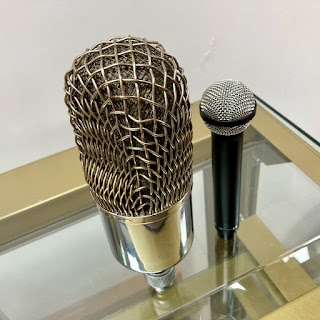To the best of my knowledge, this M30 is the earliest production model Beyer ribbon microphone. (Do please send me a message if you know of an earlier one). Here it is pictured with a modern M160 for scale.
This microphone came in for repair with most of the original piston ribbon in place. The first thing that leaps out is that, from the outset, Beyer went in their own direction for corrugating the ribbon.
I have heard a couple of suggestions about why this may be. Pistonic ribbons are in theory more efficient as the ribbon moves through the magnetic flux in a flat manner although my own measurements suggest that it only gives a couple of dB at best. Perhaps the most convincing one was Wes Dooley’s suggestion that they were circumventing RCA patents for the more common wiggly ribbons.
The magnetic circuit itself is a work of art, bringing the field from the large block magnet to the sides of the ribbon through four arms. The body of the microphone is chromed brass with one of the most substantial grills that I have ever seen. And the output transformer is a large toroidal type similar to those found in the earliest Oktava microphones and also old Siemens M201 ribbon mics.
I have talked to a lot of customers about this subject and there is a roughly equal split on which type of ribbon sounds ‘better’, with some preferring RCA style and others insisting that pistonic is best. The reader can make their own mind up about that! However, from a technical perspective, I have the equipment to make the wiggly ribbons but not the pistons.
From a historical perpective, it was nice to see the old ribbon. But it was somewhat damaged, a little corroded and stuck to the side of the motor. I took lots of photos and asked Marco, the owner, if he wanted a museum piece or a working microphone. It can be hard to make these decisions but we went ahead and repaired the microphone, which sounds rather lovely with a new ribbon in place.
Thanks to Marco at Vintage Microphone World for sharing his insight, microphones and recordings. His book ‘Witnesses of Words‘ is well worth checking out.
Update 31 July 2022
Thanks to Raphael and Carsten at Echoschall in Germany for sharing this page from an old Beyer catalog. The page shows that the M30 was priced at 700 Deutschmarks which was a lot of money at the time. There was also an M31, which I have never seen. The term “Geschwindigkeitsmikrofon” translates as “velocity microphone“.







